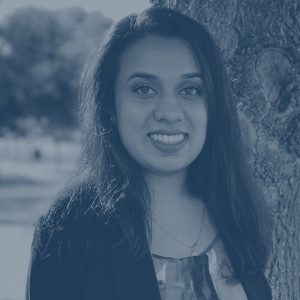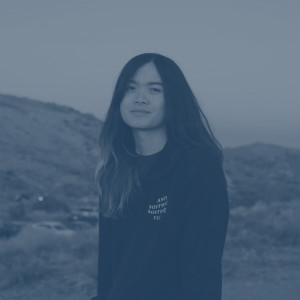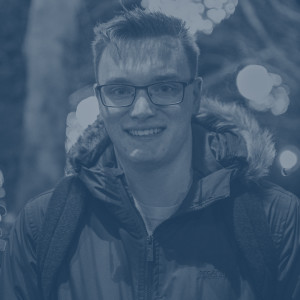Cecilia La Place, 25
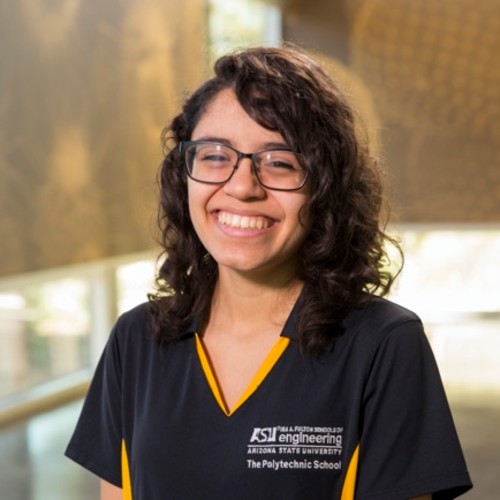
Belonging was something Cecilia had long been looking for by the time she found the hacker community. She was questioning her decision to study software engineering as she felt like she didn’t belong, and so when her friends dragged her to HackArizona 2016, she was terrified that she wouldn't fit in there either. Nagging thoughts dominated her mind on the drive there, but all she remembers from the event was how many fascinating people she met who were all excited about their ideas, the difficulties they would face, and trying new things. Cecilia was amazed at how they could be so enthusiastic about failure, because failure is not a bad thing at hackathons—it’s a learning experience. That experience made her rethink her approach to school: Cecilia hates failing but loves learning, and hackathons showed that she could reinterpret failure as a necessary part of the otherwise awesome process of learning.
The project she built with the team that dragged her there was ambitious, and it was the first time she learned something amazing that she would never find in a classroom. Cardboard Calamity was a chaotic team-building exercise inspired by terrible Freshman year icebreakers. Two people using Google Cardboard would see each others’ perspective, and in front of them, one would have a diagram of an abstract lego construction while the other has a disassembled set of legos. The goal of the exercise is for them to communicate what they are seeing so that the user with legos can recreate the diagram with color-coded brick accuracy. Cecilia knew nothing about working with Android, Google Cardboard, or video streams, and the team also had to find legos. It was an intense project for a first hackathon, and they eventually got stuck at not being able to cross the streams, but she was at least really happy with the logo they made for the project and enjoyed playing with legos to relieve stress while problem-solving.
After HackArizona 2016, Cecilia attended more hackathons and kept finding the same wholesome vibes that allowed her to thrive. She didn’t care about winning prizes because she felt she was winning every time she learned something new that wasn’t covered in school. Her mindset changed from “how can I not fail my degree” to “how much more can I learn before I decide what to specialize in” and “how many incredible stories can I hear from a diverse array of hackers.” She enjoyed meeting people at events who, like herself, had struggled to find a place in CS/engineering where they belong and can have a healthy mental state; hackathons supported them in the ways they needed: a sense of community, opportunities to learn new frameworks and languages, and a place to be themselves.
Cecilia wanted to do for others what HackArizona had done for her, so she soon joined the sunhacks team and fell head over heels into a whirlwind of organizing. After a year, she became their Director of Hacker Experience and made it her mission to cater to people who had never heard of hackathons. Based on conversations with attendees, Cecilia created intro workshops on how to build your own hackathon experience. Seeing hackers get excited about learning new things rather than stressing about what they don’t know is always Cecilia's favorite part of hackathon organization, and helping to create such an environment at sunhacks has been extremely rewarding for her.
Not only did hackathons make Cecilia change her mind about quitting university, but they also got her to finish her bachelor’s and master’s degrees, and inspired her current pursuit of a Ph.D. in hackathons. Interested by the possibility of conducting research in undergrad, and in an attempt to get the school to pay for her hackathon expenses (which didn't work), Cecilia became curious about how attendees actually learn at hackathons—many come in with no knowledge on a topic and leave 2 days later bursting at the seams with very specific knowledge. (She eventually answered this question in her first publication, examining how students can rapidly learn in hackathons; the answer is, essentially, everything a school classroom claims to but does not teach: pair-programming, talking through problem-solving, and working on problems step by step is how hackers learn from each other). Finding a love of research, Cecilia dove into other computing research topics through computer vision and machine learning projects at hackathons, which led her to a summer research position, conduct undergraduate research in a computer vision lab, and publish a paper. Upon realizing that not many people in academia were studying hackathons, Cecilia is now pursuing an engineering education Ph.D. to research hackathons. To answer all the questions she has, Cecilia’s research will leverage hackathons to study deeper human phenomenons and explore the differences and similarities between hackathons and other learning settings to improve the learning and overall experiences of such events globally.
Cecilia has worked to integrate her discoveries back into hackathon organizing at sunhacks to make the environments more welcoming and supportive of diversity, so her first time attending Hackcon as sunhacks’ newly appointed Director of Hacker Experience was terrifying but also immensely meaningful. There were organizers from women and non-binary events, international events, equal opportunity events, gigantic events, and small events. Cecilia met so many amazing organizers doing incredible things, and her nervousness quickly turned into an eagerness to learn whatever she could and apply it to sunhacks. Determined to return to Hackcon the following year with her own advice to share, Cecilia challenged herself to work on public speaking at sunhacks, as she is always trying to figure out how to make words stick in the minds of hackers. She used groan-inducing sun and plant puns not just to overcome her nervousness but to plant memorable seeds of information in attendees’ minds. She also challenged herself to make a lightning talk for the following year’s Hackcon, and it went perfectly as she told a bedtime story that called out organizers’ bad habits, lulling listeners into turning a new page and encouraging them to break the cycle. Cecilia is happy to inspire organizers to tackle public speaking from different and more fun angles.
The public speaking experience Cecilia gains from guiding introductory and closing ceremonies hone invaluable skills for her future as a researcher, as she will be expected to present her work at conferences to share her findings, albeit in a less fun format than she does at hackathons. However, she knows there are differences between presenting her research at academic conventions and at Hackcon. Presenting to different audiences has helped her learn how to tailor presentations to an audience from content to terminology, but most importantly it has helped her appear confident even when shaking like a leaf. Hackathons have also helped Cecilia learn to communicate at different levels, as a hacker, programmer, organizer, or administrator, which helps her convey complex ideas to different people in the workplace and has made her a more adaptable and concise speaker.
Having been a new hacker once herself, Cecilia knows the importance of introductory presentations to ease new hackers into the community. That’s why as an organizer she focuses on addressing the fear and discomfort that new hackers, people looking for a community, and those lacking self-confidence have when first attending a hackathon. Without a guiding hand, it can be hard to have a good first hackathon experience or even stay for the whole event, so Cecilia designed a presentation for sunhacks attendees that showed the structure of MLH hackathons while reminding them that the only expectations they should come in with are their own, as they have the power to shape their experience to get what they want out of it. Cecilia wants to challenge hackers to find what works for them in a space where everyone is welcome and worthy of support. Cecilia’s efforts have led to constant positive feedback from attendees and established sunhacks as a beginner-friendly event where everyone can feel comfortable.
While comfort is important to get new hackers in the door, Cecilia also believes a little discomfort is necessary to push hackers to become mentors at events. Hackers are often great resources, and anyone with a skill worth teaching, whether technical or abstract, can be a mentor. Cecilia makes sure to talk about how all sorts of skills are applicable at hackathons when discussing mentorship in her opening ceremony talks, and it always results in a number of last-minute signups. Creating a space that celebrates technical and abstract skills also helps create a welcoming environment for new coders and non-CS majors.
Ever since a group of hackers brought to her attention the need for accessibility accommodations a few years ago, Cecilia has been passionate about proactively looking for ways to make events more accessible whether attendees come forward about their needs or not. With the shift to digital events, she has made presentations accessible on sunhacks’ website with alternative text and recently began experimenting with closed captioning support. Although there is more work to be done, it is the start of a process to make events more accessible and further Cecilia’s goal of making sunhacks welcoming for everyone. To those ends, sunhacks has made great strides, as half of the speakers at their last event were non-white and half identified as women. The dearth of racial and gender diversity in STEM can start to be addressed by promoting visible representation of minority groups at hackathons, and Cecilia aims to make next year’s event even more accessible by positively and visibly supporting LGBTQIA+ hackers and continuing to have diverse representation among their speakers and mentors.
Cecilia never imagined that she would be admirable or inspiring, but her work in the hacker community has spoken for her as many people have reached out to her and sunhacks asking for insights on their success and become fascinated by her research. Although not the most confident person, Cecilia is incredibly stubborn, diligent, and curious in her attempts to grow the hackathon audience, continually pursue change to prevent stagnation and complacency, and keep the community a place of opportunity and growth for those who fail to find inspiration in school curriculums. The hackathon community has pushed her out of her comfort zone to be an organizer, presenter, and researcher, and the work that she has done stands out as successful and valuable efforts to help people find hackathons as a place where they belong. She likes to think that she has helped carve out a home for hundreds of people to grow beyond what they thought was ever possible, and she hopes that conducting and applying her research in the future will let her build a home for thousands.
Quick Facts
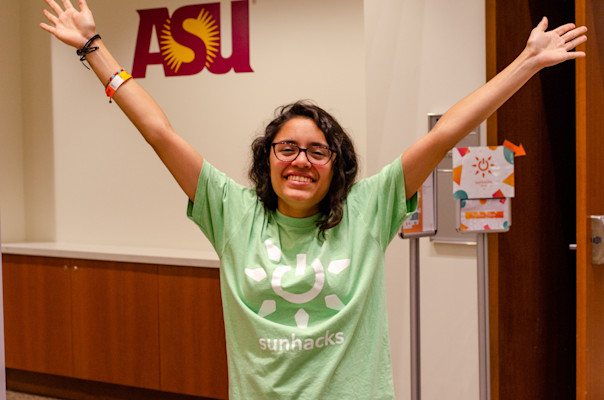
Cecilia La Place, 25

Belonging was something Cecilia had long been looking for by the time she found the hacker community. She was questioning her decision to study software engineering as she felt like she didn’t belong, and so when her friends dragged her to HackArizona 2016, she was terrified that she wouldn't fit in there either. Nagging thoughts dominated her mind on the drive there, but all she remembers from the event was how many fascinating people she met who were all excited about their ideas, the difficulties they would face, and trying new things. Cecilia was amazed at how they could be so enthusiastic about failure, because failure is not a bad thing at hackathons—it’s a learning experience. That experience made her rethink her approach to school: Cecilia hates failing but loves learning, and hackathons showed that she could reinterpret failure as a necessary part of the otherwise awesome process of learning.
The project she built with the team that dragged her there was ambitious, and it was the first time she learned something amazing that she would never find in a classroom. Cardboard Calamity was a chaotic team-building exercise inspired by terrible Freshman year icebreakers. Two people using Google Cardboard would see each others’ perspective, and in front of them, one would have a diagram of an abstract lego construction while the other has a disassembled set of legos. The goal of the exercise is for them to communicate what they are seeing so that the user with legos can recreate the diagram with color-coded brick accuracy. Cecilia knew nothing about working with Android, Google Cardboard, or video streams, and the team also had to find legos. It was an intense project for a first hackathon, and they eventually got stuck at not being able to cross the streams, but she was at least really happy with the logo they made for the project and enjoyed playing with legos to relieve stress while problem-solving.
After HackArizona 2016, Cecilia attended more hackathons and kept finding the same wholesome vibes that allowed her to thrive. She didn’t care about winning prizes because she felt she was winning every time she learned something new that wasn’t covered in school. Her mindset changed from “how can I not fail my degree” to “how much more can I learn before I decide what to specialize in” and “how many incredible stories can I hear from a diverse array of hackers.” She enjoyed meeting people at events who, like herself, had struggled to find a place in CS/engineering where they belong and can have a healthy mental state; hackathons supported them in the ways they needed: a sense of community, opportunities to learn new frameworks and languages, and a place to be themselves.
Cecilia wanted to do for others what HackArizona had done for her, so she soon joined the sunhacks team and fell head over heels into a whirlwind of organizing. After a year, she became their Director of Hacker Experience and made it her mission to cater to people who had never heard of hackathons. Based on conversations with attendees, Cecilia created intro workshops on how to build your own hackathon experience. Seeing hackers get excited about learning new things rather than stressing about what they don’t know is always Cecilia's favorite part of hackathon organization, and helping to create such an environment at sunhacks has been extremely rewarding for her.
Not only did hackathons make Cecilia change her mind about quitting university, but they also got her to finish her bachelor’s and master’s degrees, and inspired her current pursuit of a Ph.D. in hackathons. Interested by the possibility of conducting research in undergrad, and in an attempt to get the school to pay for her hackathon expenses (which didn't work), Cecilia became curious about how attendees actually learn at hackathons—many come in with no knowledge on a topic and leave 2 days later bursting at the seams with very specific knowledge. (She eventually answered this question in her first publication, examining how students can rapidly learn in hackathons; the answer is, essentially, everything a school classroom claims to but does not teach: pair-programming, talking through problem-solving, and working on problems step by step is how hackers learn from each other). Finding a love of research, Cecilia dove into other computing research topics through computer vision and machine learning projects at hackathons, which led her to a summer research position, conduct undergraduate research in a computer vision lab, and publish a paper. Upon realizing that not many people in academia were studying hackathons, Cecilia is now pursuing an engineering education Ph.D. to research hackathons. To answer all the questions she has, Cecilia’s research will leverage hackathons to study deeper human phenomenons and explore the differences and similarities between hackathons and other learning settings to improve the learning and overall experiences of such events globally.
Cecilia has worked to integrate her discoveries back into hackathon organizing at sunhacks to make the environments more welcoming and supportive of diversity, so her first time attending Hackcon as sunhacks’ newly appointed Director of Hacker Experience was terrifying but also immensely meaningful. There were organizers from women and non-binary events, international events, equal opportunity events, gigantic events, and small events. Cecilia met so many amazing organizers doing incredible things, and her nervousness quickly turned into an eagerness to learn whatever she could and apply it to sunhacks. Determined to return to Hackcon the following year with her own advice to share, Cecilia challenged herself to work on public speaking at sunhacks, as she is always trying to figure out how to make words stick in the minds of hackers. She used groan-inducing sun and plant puns not just to overcome her nervousness but to plant memorable seeds of information in attendees’ minds. She also challenged herself to make a lightning talk for the following year’s Hackcon, and it went perfectly as she told a bedtime story that called out organizers’ bad habits, lulling listeners into turning a new page and encouraging them to break the cycle. Cecilia is happy to inspire organizers to tackle public speaking from different and more fun angles.
The public speaking experience Cecilia gains from guiding introductory and closing ceremonies hone invaluable skills for her future as a researcher, as she will be expected to present her work at conferences to share her findings, albeit in a less fun format than she does at hackathons. However, she knows there are differences between presenting her research at academic conventions and at Hackcon. Presenting to different audiences has helped her learn how to tailor presentations to an audience from content to terminology, but most importantly it has helped her appear confident even when shaking like a leaf. Hackathons have also helped Cecilia learn to communicate at different levels, as a hacker, programmer, organizer, or administrator, which helps her convey complex ideas to different people in the workplace and has made her a more adaptable and concise speaker.
Having been a new hacker once herself, Cecilia knows the importance of introductory presentations to ease new hackers into the community. That’s why as an organizer she focuses on addressing the fear and discomfort that new hackers, people looking for a community, and those lacking self-confidence have when first attending a hackathon. Without a guiding hand, it can be hard to have a good first hackathon experience or even stay for the whole event, so Cecilia designed a presentation for sunhacks attendees that showed the structure of MLH hackathons while reminding them that the only expectations they should come in with are their own, as they have the power to shape their experience to get what they want out of it. Cecilia wants to challenge hackers to find what works for them in a space where everyone is welcome and worthy of support. Cecilia’s efforts have led to constant positive feedback from attendees and established sunhacks as a beginner-friendly event where everyone can feel comfortable.
While comfort is important to get new hackers in the door, Cecilia also believes a little discomfort is necessary to push hackers to become mentors at events. Hackers are often great resources, and anyone with a skill worth teaching, whether technical or abstract, can be a mentor. Cecilia makes sure to talk about how all sorts of skills are applicable at hackathons when discussing mentorship in her opening ceremony talks, and it always results in a number of last-minute signups. Creating a space that celebrates technical and abstract skills also helps create a welcoming environment for new coders and non-CS majors.
Ever since a group of hackers brought to her attention the need for accessibility accommodations a few years ago, Cecilia has been passionate about proactively looking for ways to make events more accessible whether attendees come forward about their needs or not. With the shift to digital events, she has made presentations accessible on sunhacks’ website with alternative text and recently began experimenting with closed captioning support. Although there is more work to be done, it is the start of a process to make events more accessible and further Cecilia’s goal of making sunhacks welcoming for everyone. To those ends, sunhacks has made great strides, as half of the speakers at their last event were non-white and half identified as women. The dearth of racial and gender diversity in STEM can start to be addressed by promoting visible representation of minority groups at hackathons, and Cecilia aims to make next year’s event even more accessible by positively and visibly supporting LGBTQIA+ hackers and continuing to have diverse representation among their speakers and mentors.
Cecilia never imagined that she would be admirable or inspiring, but her work in the hacker community has spoken for her as many people have reached out to her and sunhacks asking for insights on their success and become fascinated by her research. Although not the most confident person, Cecilia is incredibly stubborn, diligent, and curious in her attempts to grow the hackathon audience, continually pursue change to prevent stagnation and complacency, and keep the community a place of opportunity and growth for those who fail to find inspiration in school curriculums. The hackathon community has pushed her out of her comfort zone to be an organizer, presenter, and researcher, and the work that she has done stands out as successful and valuable efforts to help people find hackathons as a place where they belong. She likes to think that she has helped carve out a home for hundreds of people to grow beyond what they thought was ever possible, and she hopes that conducting and applying her research in the future will let her build a home for thousands.
Quick Facts

